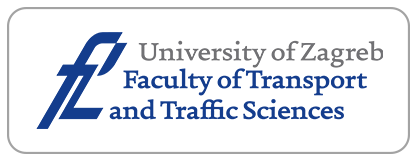Numerical Simulation of Vehicle Tyre under Various Load Conditions and Its Effect on Road Traffic Safety

Downloads
The main objective of the transport reliability and maintenance analysis is to improve the understanding of accidents through incident investigations. This research focuses on composite pneumatic tyres used in transportation engineering and presents both theoretical and experimental studies. The finite element method used for numerical simulation combined with pre-experimental measurements based on optimisation by material vibration response is presented for tyre material modelling. Piezoelectric vibration test was used for the pre-experimental test of the tyre quarters. The simulation results indicate that the pneumatic tyre with the recommended air pressure inflation shows the least amount of deformation. In comparison, pneumatic tyres with recommended and reduced air pressure inflation of 0.25, 0.5 and 0.75 bar are under research. Additionally, it was established that, when subjected to external forces that exceed the tyre’s maximum weight capacity, as determined by the manufacturer, the tyre exhibits significant stiffening and internal stress. The research suggests that this methodology can be used to obtain a realistic model of vehicle tyre dynamic processes and assess the impact on road traffic safety with different inflation pressures and loads.
Downloads
Abohassan A, El-Basyouny K, Kwon T. Exploring the associations between winter maintenance operations, weather variables, surface condition, and road safety: A path analysis approach. Accident Analysis & Prevention. 2021;163:1-10. DOI: 10.1016/j.aap.2021.106448.
United Nations Economic Commission. Statistics of road traffic accidents in Europe and North America. United Nations Publications (UNECE); 2021. https://unece.org/transport/publications/2021-statistics-road-traffic-accidents-europe-and-north-america.
World Health Organization (WHO). European regional status report on road safety 2019. WHO Regional Office for Europe CCBY-NC-SA3.0IGO; 2020. https://apps.who.int/iris/handle/10665/336584.
Chen S, Kuhn M, Prettner K, Bloom D. The global macroeconomic burden of road injuries: Estimates and projections for 166 countries. The Lancet Planetary Health. 2019;3(9):390-398. DOI: 10.1016/S2542-5196(19)30170-6.
Caban J, et al. Road traffic safety in Poland, Slovakia and Czech Republic – Statistic analysis. 2020 XII International Science-Technical Conference AUTOMOTIVE SAFETY, Kielce, Poland. 2020. p. 1-7. DOI: 10.1109/AUTOMOTIVESAFETY47494.2020.9293507.
European Commission. Joint Research Centre (JRC) Publications Repository. The Future of Road Transport. Publications Office of the EU, JRC226644; 2019. https://publications.jrc.ec.europa.eu/repository/handle/JRC116644.
Zhu J, Han K, Wang, S. Automobile tire life prediction based on image processing and machine learning technology. Advances in Mechanical Engineering. 2021;13(3):1-13. DOI: 10.1177/16878140211002727.
Jung H, Silva R, Han M. Scaling trends of electric vehicle performance: driving range, fuel economy, peak power output, and temperature effect. World Electric Vehicle Journal. 2018;9(4):1-14. DOI: 10.3390/wevj9040046.
Ružinskas A, et al. Experimental investigation of tire performance on slush. Eksploatacjai Niezawodnosc – Maintenance and Reliability. 2021;23(1):103-109. DOI: 10.17531/ein.2021.1.11.
Osueke E, Uguru-Okorie D. The role of tire in car crash, its causes and prevention. International Journal of Emerging Technology and Advanced Engineering. 2012;2(12):55-57.
Paine M, Griffiths M, Magedara N. The role of tyre pressure in vehicle safety, injury and environment. Accident Research Centre at Monash University. 2007. https://www.nrspp.org.au/resources/the-role-of-tyre-pressure-in-vehicle-safety-injury-and-environment/.
Karpenko M, Prentkovskis O, Skačkauskas P. Comparison analysis between pneumatic and airless tires by computational modelling for avoiding road traffic accidents. 22nd International Multidisciplinary Conference on Reliability and Statistics in Transportation and Communication, RelStat 2022, Lecture Notes in Networks and Systems. 2023;640:295-305. DOI: 10.1007/978-3-031-26655-3_28.
Stokłosa J, Bartnik M. Influence of tire pressure on the vehicle braking distance. The Archives of Automotive Engineering – Archiwum Motoryzacji. 2022;97(3):60-73. DOI: 10.14669/AM/155136.
Szczucka-Lasota B, Węgrzyn T, Łazarz B, Kamińska J. Tire pressure remote monitoring system reducing the rubber waste. Transportation Research Part D: Transport and Environment. 2021:98:1-14. DOI: 10.1016/j.trd.2021.102987.
Chen K, Yeh C. Preventing tire blowout accidents: A perspective on factors affecting drivers’ intention to adopt tire pressure monitoring system. Safety. 2018;4(16):1-14. DOI: 10.3390/safety4020016.
Changzheng W, et al. TPMS (tire-pressure monitoring system) sensors: Monolithic integration of surface-micromachined piezo resistive pressure sensor and self-testable accelerometer. Microelectronic Engineering. 2012;91:167-173. DOI: 10.1016/j.mee.2011.10.001.
Bogdevičius M, Karpenko M, Rožytė D. Methodology for determination coefficients values of the proposed rheological model for the tire tread. TRANSBALTICA XII: Transportation Science and Technology. Lecture Notes in Intelligent Transportation and Infrastructure. 2022. p. 16-27. DOI: 10.1007/978-3-030-94774-3_2.
Rievaj V, Faith P, Dávid A. Measurement by a cylinder test stand and tyre rolling resistance. Transport. 2006;21(1):25-28. DOI: 10.3846/16484142.2006.9638036.
Korunović N, et al. Performance evaluation of cord material models applied to structural analysis of tires. Composite Structures. 2019;224:1-13. DOI: 10.1016/j.compstruct.2019.111006.
Błażejewski W, et al. The mechanical investigation of filament-wound CFRP structures subjected to different cooling rates in terms of compressive loading and residual stresses—An experimental approach. Materials. 2021;14:1041. DOI: 10.3390/ma14041041.
Wang W, Yan S, Zhao S. Experimental verification and finite element modelling of radial truck tire under static loading. Journal of Reinforced Plastics and Composites. 2013;32(7):490-498. DOI: 10.1177/0731684412474998.
Sapragonas J. et al. Research of the influence of tire hydroplaning on directional stability of vehicle. Transport. 2013;28(4):374-380. DOI: 10.3846/16484142.2013.865673.
Makrygianni MJ. Aircraft accident evaluation using quality assessment tools. Aviation. 2018;22(2):67-76. DOI: 10.3846/aviation.2018.5995.
Baranowski P, Małachowski J, Mazurkiewicz L. Local blast wave interaction with tire structure. Defence Technology. 2020;16(3):520-529. DOI: 10.1016/j.dt.2019.07.021.
Janulevičius A, et al. Dependencies of the lead of front driving wheels on different tire deformations for a MFWD tractor. Transport. 2017;32(1):23-31. DOI: 10.3846/16484142.2015.1063084.
Kubit A, et al. Experimental analysis of ultralight aircraft tyre behaviour under aircraft landing phase. Aviation. 2022;26(2):124-129. DOI: 10.3846/aviation.2022.17000.
Abe A, Kamegawa T, Nakajima Y. Optimization of construction of tire reinforcement by genetic algorithm. Optimization and Engineering. 2004;5:77-92. DOI: 10.1023/B:OPTE.0000013636.82848.01.
Avril S, Bonnet M, Bretelle A. Overview of identification methods of mechanical parameters based on full-field measurements. Experimental Mechanics. 2008;48(4):381-402. DOI: 10.1007/s11340-008-9148-y.
Jones R. Mechanics of composite materials. CRC Press. 1999. DOI: 10.1201/9781498711067.
Helnwein P, Liu C, Meschke G, Mang H. A new 3-D finite element model for cord-reinforced rubber composites – Application to analysis of automobile tires. Finite Elements in Analysis and Design. 1993;14:1-16. DOI: 10.1016/0168-874X(93)90075-2.
Karpenko M. Investigation of energy efficiency of mobile machinery hydraulic drives. PhD thesis. Vilnius Gediminas Technical University; 2021. DOI: 10.20334/2021-028-M.
Karpenko M, Nugaras J. Vibration damping characteristics of the cork-based composite material in line to frequency analysis. Journal of Theoretical and Applied Mechanics. 2022;60(4):593-602. DOI: 10.15632/jtam-pl/152970.
Newmark N. A method of computation for structural dynamics. ASCE Journal of the Engineering Mechanics Division. 1959;85(EM3):1-15.
Hashamdar H, Ibrahim Z, Jameel. Finite element analysis of nonlinear structures with Newmark method. International Journal of the Physical Sciences. 2011;6(6):1395-1403. DOI: 10.5897/IJPS11.093.
Karpenko M, Skačkauskas P, Prentkovskis O. Methodology for the composite tire numerical simulation based on the frequency response analysis. Eksploatacja i Niezawodność – Maintenance and Reliability. 2023. DOI: 10.17531/ein/163289.
Copyright (c) 2024 Mykola Karpenko, Olegas Prentkovskis , Paulius Skačkauskas

This work is licensed under a Creative Commons Attribution-NonCommercial 4.0 International License.




















